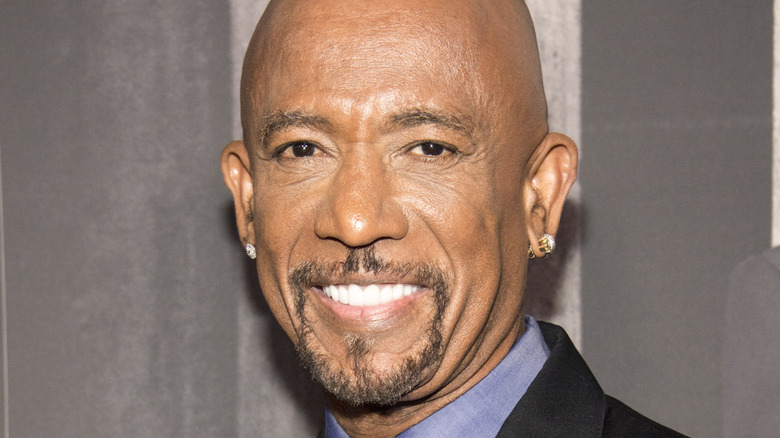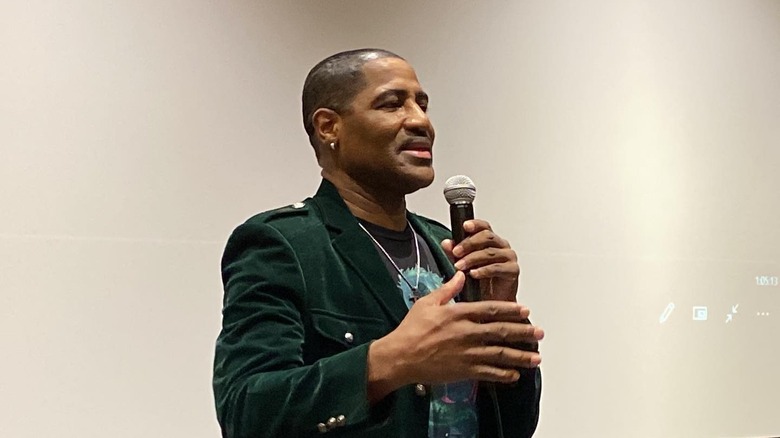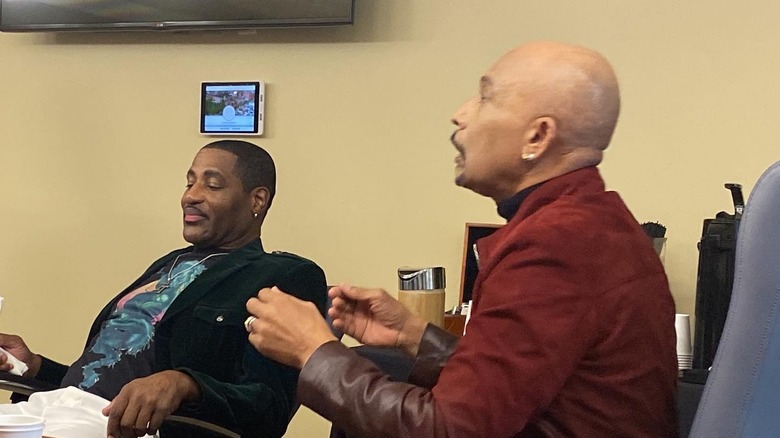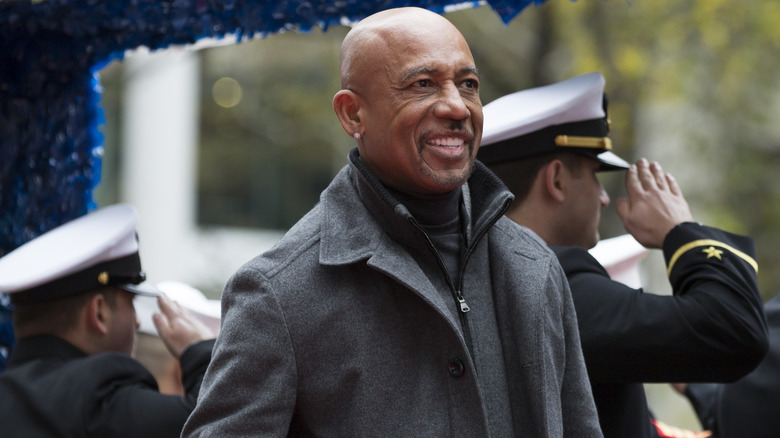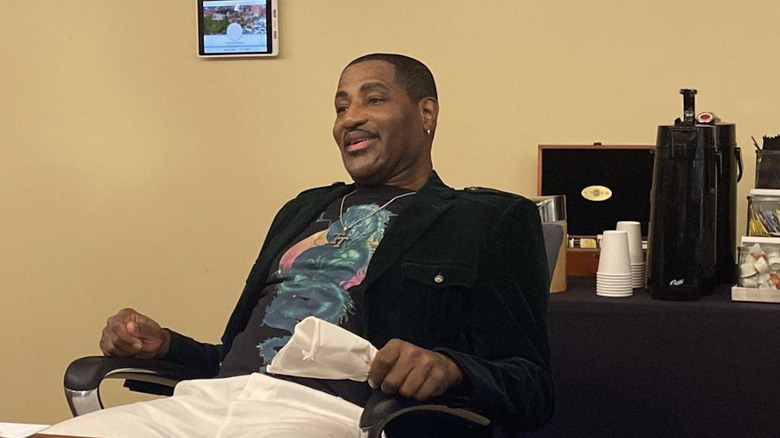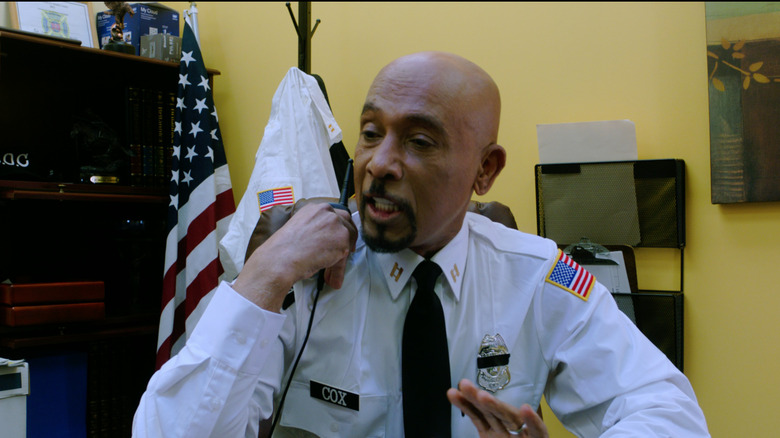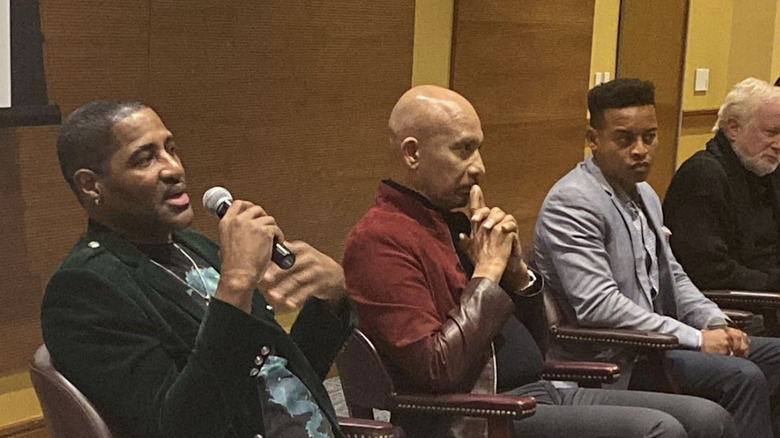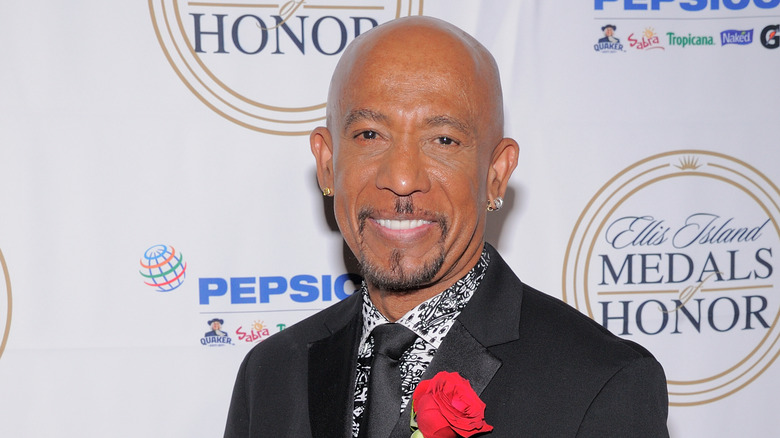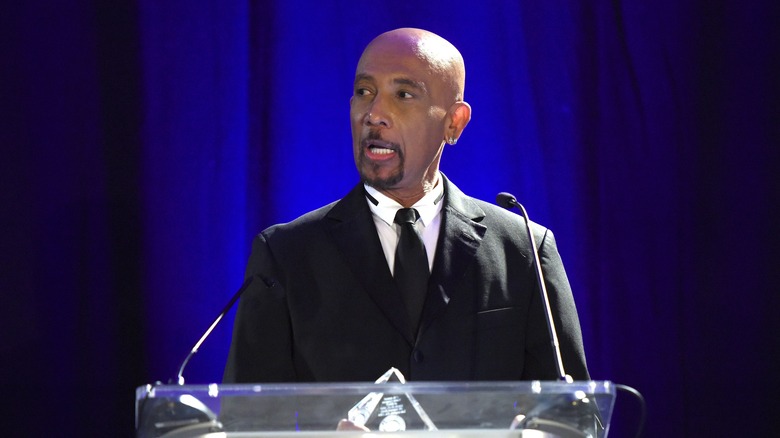Montel Williams And Terrance Tykeem Discuss When George Got Murdered - Exclusive Interview
We may receive a commission on purchases made from links.
This article discusses child abuse, sexual assault, and the murder of George Floyd as well as other police killings.
"When George Got Murdered?" is a reimagining of what happened inside the jail where George Floyd's killer and ex-cop Derek Chauvin was held in Spring 2020. The film follows the guards, inmates, and the captain (played by Montel Williams) as they process what's taking place in the city and around the world in response to Floyd's murder, all while his killer is in the same jail. Tensions only mount as they realize that none of the minority guards in the jail are being allowed to work the unit where Chauvin is being held.
The powerful film was written and directed by Terrance Tykeem, who's also known for his film "Jason's Letter," which addresses an unarmed police shooting. Prior to the release of "When George Got Murdered," Tykeem and Williams sat down for an exclusive interview with Nicki Swift to discuss the project. They shared the many difficulties in telling a story like this and why it's so important not to shy away from the topic and continue to keep the conversation about police brutality in America going.
What made them want to tell this story
Terrance, what first made you want to tell this story?
Terrance: It's one of these kinds of films that ... everybody knows the subject matter, so I had to be brave enough to want to tell it. Like I said in all these interviews, it would've been irresponsible of me to try to recreate the whole thing with this guy being killed on the ground. I was not going to touch that. I wanted to come at it from a different standpoint.
I went from the standpoint of telling what happened, how the story really affected everybody, the nation, and the world. I went at it from the standpoint of telling it from there so people could see what was happening and becoming engaged, because most people were engaged because we were all stuck in our homes at the time when this whole thing happened. Once I heard about the fact that they would not let any of the minority guards work the block where they were keeping him, I knew I had to incorporate that into the film, so that's what I did.
Montel, what made you want to be part of the project?
Montel: The way Terrance has explained it. He reached out to me and said that he was going at it from a different point of view, and the subject matter and the way he presents it leads to more conversations and more discussion.
The most important part in telling this story
As you said, it's such an important subject and also very emotional to a lot of people. Did you feel a lot of pressure in how you approached it and making sure you got it right?
Terrance: Yeah. Anytime you tell a story about something of that [nature], you're going to feel the pressure from it. We already know that there's a built-in audience for anything dealing with social justice, [but] because there's a group of people who don't care ... They love the cops. They're going to go with the cop no matter what. I don't know what that is, but these are nothing but people, these are not superheroes and no people from another planet. For whatever reason, they feel as though they need to [side with the police] no matter what.
We knew when we did the movie that we had a built-in audience for this subject matter. You hope to bring to more people along the way to open up their minds and make them see and understand what the subject matter is, and the fact that we're trying to tell a story, which pretty much tells itself. All I pretty much did was told the story of what was going on. I wanted to add a twist to it towards the end of the film to show that this guy behind that prison door is still able to feel what was going on with them and what was going on inside the jail at the time.
Did you feel like there were any elements to the story that were the most important to get right?
Terrance: The most important part for me was telling the story from the standpoint of letting it be known that we're dealing with an issue that people need to know more about, which is the whole thing about how the families were being exploited, the presence of this guy being inside the jail, and how his presence touched everybody's existence. Inside the jail, outside the jail, at their homes, their relationships, I wanted to show all of that.
That's why I showed all of those different scenarios, what those guards were going through, even Montel's part, in the jail, how it was affecting every aspect of him working there. You could see on certain things that it was affecting his life all around, because he was dealing with other things inside the jail, such as the abuse that was going on inside. I wanted to show that it was really touching every aspect of each person's life.
Montel explains what it was like to play such a 'static' role
Montel, what did you feel was the most important part of your role in the film?
Montel: Terrance nailed it. It's trying to show that juxtaposition there. You're a jail captain, but at the same time, you've got to protect the inmate as much as you have to protect the employees. Right now, Terrance had said that several of the employees who quit resigned over the fact that they had been automatically thought of as being too racist to protect Chauvin. Telling the whole story, letting people understand that this was not just some simple thing, locking the guy up, waiting for 30 days for a trial — this was how it impacted the people who had to facilitate that every day.
Terrance: Right.
It's also interesting because your character, he doesn't move throughout the whole story. There's so much going on, but you're sitting at the desk the whole time...
Montel: Which is like a lot of those individuals do. After [Chauvin] was arrested, and he's placed in the prison cell waiting for his trial, think back. A lot of things sat dormant in America. We didn't do anything in the whole trial, and then, [during] the trial, everybody revoiced their opinions, but people really weren't as active as they were leading up to him going into prison. My character was very interesting. I was in a well-placed position of him being static, not being dynamic, but being static and going with the flow. You get an order that says, "Don't let the guards of color anywhere near this guy." He doesn't do anything. He says, 'Okay, none of you guys are going to be near this guy.' His physical position and his mental position were pretty much in lockstep.
How the film became feature length
You mentioned before you did the unexpected ending to the film. Was that something you knew you wanted to do from the beginning, Terrance?
Terrance: Yeah, you know what's so crazy? This is only a short film. It's supposed to be about 20 minutes. If I would've left it at a short film, it would've been [released more quickly], because right now, I'm really discouraged at the fact that I'm not able to tell this story in the meat of when all of that stuff was going on. I'm really discouraged by it. Initially, I wanted to release it on the first trial date for Chauvin, but we didn't get it ready in time ... If I would've released it as a regular short film, I would've had it ready a long time ago, but I'm listening to these distributors [saying], "Oh, no. You got to get us a longer film," and so, I [made] it longer.
I had it ready for May 25th, but then, that shooting in Uvalde happened, which consumed the media. We had it ready for the release to coincide with the trial, starting up with the other two officers, because the trial was supposed to start [the day of this interview]. Now, they just postponed that until January of next year. I'm really discouraged that I was not able to get this film out in the meat of what was going on with the trial.
It would've impacted the release of the film, but it would've solidified the impact of it, period. It would've been more impactful for people to gravitate and come to the film. That's the only thing I'm a little disappointed in, that I didn't get this film out in the time when that subject matter was really out there. Actually, when I bumped it up from 28 minutes to 42, if I would've left it at 42, I could have had it out in time while some of the other media was still going on.
I'm sorry. I didn't answer your question, but it was short because of that ending. I wanted that ending there because I wanted people to see that even this guy, after what he had done, he was able to see all the corruption that was going on inside the prison.
The biggest challenges making this film
What would both of you say was the most challenging aspect to doing this project?
Montel: For Terrance, you can see it, life and schedule. Life went on, and things moved. Now, they've postponed the trial again until the first of next year. Trying to schedule something that's this time-sensitive, where there's no real calendar, is tough.
Terrance: It's tough. Yeah.
Montel: I give all kudos to Terrance for doing what he was able to do.
Terrance: Thanks, man. Like Montel just said, that was the tough part, trying to make sure we can get it where it could have the most impact. We've been wrestling with it from the word "go." They canceled those guys' trials the first time. This might be the third cancellation. I'm not really sure. This might be the second or third; I'm not really sure. They pushed back Chauvin's sentencing date, and then, when they pushed it back, it gave us more time. Then, they moved the sentencing day up while we were trying to get it together, so it's been a rollercoaster ride trying to match that time.
The most difficult part was not making the film. They were trying to make sure we can get it out to capitalize for more people to see it and get the message from it. It was on their calendar — the trial, the sentencing, George Floyd's anniversary. Now, we could have made the anniversary, but then, that Uvalde shooting had pretty much consumed the media. As a matter of fact, if you recall it — correct me if I'm wrong, Montel, the only thing I heard about George Floyd's death anniversary that day was President Biden signed the George Floyd Act.
Montel: Yes.
Terrance: That's the only thing I heard about it then.
Montel: We heard nothing else about it since.
Terrance: We heard nothing about it since, but you got to remember something. Me and Montel, we talk about this when we had the screenings. This is an issue that people don't want. This is almost like child sexual abuse. When you're dealing with cop stuff, it's just like child sexual abuse. They want to sweep it under the rug. They want to act like it's not going on. They want to ignore it at all costs. All of this brutality, they want to keep acting like it's a figment of somebody's imagination.
If you or someone you know may be the victim of child abuse, please contact the Childhelp National Child Abuse Hotline at 1-800-4-A-Child (1-800-422-4453) or contact their live chat services.
If you or anyone you know has been a victim of sexual assault, help is available. Visit the Rape, Abuse & Incest National Network website or contact RAINN's National Helpline at 1-800-656-HOPE (4673).
Tykeem's thoughts on Grand Rapids shooting
Terrance: [There are] new ones every day. It took them three, four months to charge this guy up here in Grand Rapids. They finally charged the cop. Laying on the guy's back, holding the guy down, takes his gun, places it to the back of his head, and blows his brains out through his mouth — you take three months to charge the guy. Yeah, it's a vicious cycle, and I want to be able to tell these kinds of stories to keep shining the light on it.
The good thing about it is that me and the two PR people I'm working with, whenever the trial is, we're going to relaunch the film again anyway. The film's probably going to get a second life once they do have the trial. We're going to relaunch it at some point because we're going to get as much media attention as we can right now. The good thing about it is that Amazon sent a notification that we're getting a lot of orders for the film — we just saw that from their streaming team. So far, [people are] ordering the film to watch the film. That's a good thing, but I wanted it to be on a bigger scale.
They hope the film sparks needed conversation
What are you hoping that most people take away after watching this?
Montel: From my perspective, I hope that it sparks the conversation that's well needed in America. Unfortunately, I'm so jaded. I don't know if America's ready to sit down and have that conversation.
Terrance: Right now, we know the reality of this. "Jaded" is an understatement for what I am right now. We know the reality, but we still have to ... When you get a platform like this, you have to do it. We got two huge radio shows that my other PR person just set up for us to do. On those radio shows, we get to kind of like talk with people who probably feel more the same way we do. I'm always doing the blog shows and the TV shows. Oone thing about when you do radio shows is, because they have to keep the shows really hyped and noisy, they got to be animated through the whole show, and that brings that excitement to it.
I'm always looking for shows like that when everybody can get excited about the topic, but all PR is great PR. I love when it's a bunch of people in the room, and everybody's chiming in on the subject. I'm like Montel. At this point, we need to be in a position to tell the story, because people have already gone to their corners. People have retreated into their corners, and no matter what you say, [one side] can see a hundred people get killed by the cops a day; to them, it's like, "Okay. Well, what did he do? Okay. What happened before that?"
[An officer] killed somebody. What difference does it make what happened before that? You kill somebody, [not just injure them]. They're never coming back, and you are putting somebody's job ahead of somebody's life. That's how far gone we are, that they care more about what the person was doing at that job than what that person was doing that took somebody's life. He'll never see their son, their mother, or their grandfather, or their grandmother, or their kids. It's insane. The fact that this is the only country that's really at this degree with this is the sad part about this whole thing.
It takes a lot to make these kinds of projects
[Do] either of you have anything you want to add for people to know?
Terrance: When you do the article, make sure that you mention the fact that it takes a lot to do these kinds of projects. From a mental standpoint, you got to be brave enough to do these topics. Like I told Donnamarie [Davis, who plays C.O. Davis] in a couple of other interviews, she didn't understand that people that she knew for all her life were not going to agree with the fact that she was involved in a movie like this. Now, she's emotionally scarred by that, but I tried to forewarn her before we did the film. She's seeing it firsthand. There were people I had known for years. I had to unfriend them on my social media because I knew that they were horrible people. When you start making excuses for somebody getting killed, then there's something wrong with you.
"When George Got Murdered" is now available on digital streaming platforms including Prime Video, Google Play, Youtube, and JustWatch.
